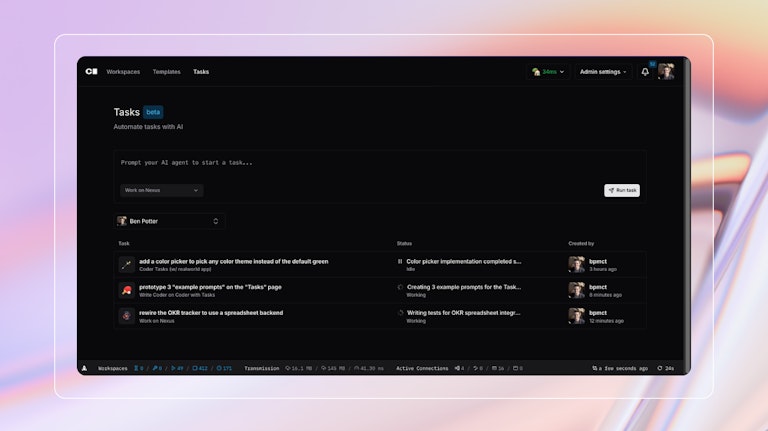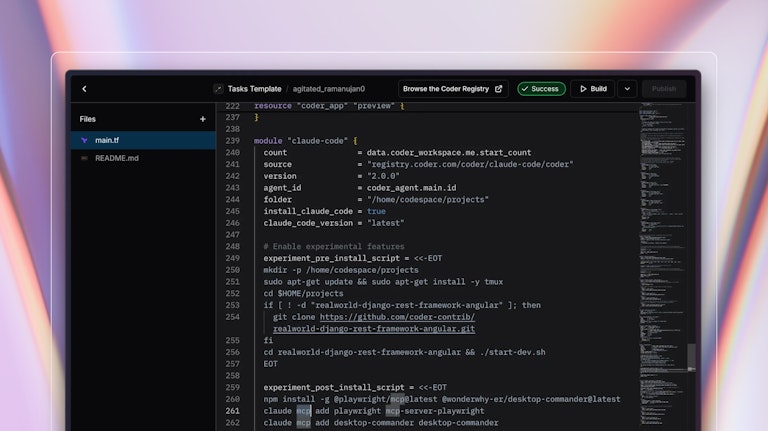Day 1: Run AI Coding Agents on Your Own Infrastructure with Coder Tasks

This post marks Day 1 of Coder Launch Week! We’ll share a new announcement each day. Check back on the Launch Week page for updates.
AI coding agents such as Claude Code, Amazon Q, and Aider are exciting to demo, but can be incredibly challenging to operationalize in the real world. For enterprises, security reviews, cost analysis, and governance are table stakes. Agent-assisted programming introduces an entirely new set of challenges that most organizations aren’t prepared for yet.
In this post, we’ll explore why operationalizing coding agents is hard, what risks you need to manage, and how Coder Tasks lets you safely and effectively deploy AI agents on your own infrastructure.
The hidden risks of running agents on local machines
Most developers we speak to remain skeptical that agents are capable of understanding and working within their codebase. And running agents locally? It’s fine for exploring AI-assisted coding, but not a viable long-term solution.
It doesn’t scale and, worse, it compromises either security or productivity:
- Granting agents free rein on your laptop exposes your emails, files, source code, and more, increasing your risk profile.
- Constant prompt engineering or approvals for every request slows work down and invites human error.
Coder Tasks: Bringing coding agents into secure, managed workspaces
Coder Tasks lets enterprises and hobbyists alike self-host coding agents in practical, secure environments on your existing infrastructure.
With Coder Tasks, developer teams can use best-in-class agents as true sidekicks: answering questions, fixing bugs, and reviewing their code within their IDEs or through the Coder dashboard.
Whether you prefer in-IDE agents (e.g., Copilot, Windsurf, and Cursor) or headless agents (e.g., Claude Code, Amazon Q, Aider, and Goose), Coder has you covered.
Soon, you’ll be able to work with agents in Slack, GitHub, or via Coder’s CLI and MCP servers.

Confidently provision agents with Templates and Boundaries
Administrators manage Coder Templates, which are the blueprints for provisioning coding agents, powered via Terraform.
These templates define:
- The agents your teams use
- Boundaries for process isolation
- Integration points for MCP tools
- Connections to on-prem LLMs, enterprise AI subscriptions, API routers, or cloud LLM providers (e.g., AWS Bedrock)

Templates ensure coding agents operate with the right permissions, in the right places, every time.
Developer AI adoption is surging in the enterprise
Over the past two years, AI-assisted development has emerged as a leading priority for the enterprise developer productivity teams we work with. This mirrors a broader trend across industries.
78% of companies reported using AI in at least one function in 2024, up from 55% in 2023.
— 2025 Stanford AI Index Report
Like any new technology, there is a maturity curve. However, almost all developer productivity organizations have introduced lightweight AI assistants to their developers. Among our customers, we are seeing a mix of technology, government, and financial services organizations leading the charge with adopting coding agents.
Claude Code’s creators, Anthropic, have seen strong internal adoption of the agent on remote environments. We’ll be sharing more on this topic soon–stay tuned!
5 use cases where coding agents shine today
To help you cut through the hype, here are five practical, low-barrier use cases for coding agents that teams can operationalize right now:
- Answering questions about the codebase (e.g., explaining the tech stack or an error)
- Prototyping and demo applications (often referred to as “vibe coding” for quick ideas)
- Documentation reviews (e.g., auditing documentation for correctness)
- Visual updates (e.g., spacing tweaks, text copy changes, etc.)
- Experimentation (e.g., testing what agents can do in your environment)
Secure coding agents without sacrificing their usefulness
Running coding agents on remote servers already reduces risk by isolating them from your emails, personal disk files, applications, and other information unrelated to the task at hand.
However, it is still important to consider other ways to isolate your agent from doing things you don't want them to, while ensuring that it still has the agency and information it needs to complete tasks.
Some steps you can take to safeguard your environments include:
- Issuing read-only API tokens for systems providing context for the task at hand like GitHub, Jira, and Backstage
- Enforcing firewalls so agents can only connect through your corporate proxy or API gateway, blocking direct access to external servers
- Audit tool calls and consider AI proxies or self-hosted LLMs to prevent leaking secrets or source code to LLMs
- Set resource quotas to ensure agents do not spend too much in CPU, GPU, or tokens on a given task
The future: Always-on coding agent assistants
As LLMs and agents improve, they’ll:
- Run longer in the background without interruption
- Debug their own work
- Gather richer context beyond the initial prompt from previous solutions, architectural patterns, related PRs, or product requirements (via MCP)
- Communicate seamlessly with the user via tried-and-true channels (e.g., GitHub, Slack, Jira)
We believe organizations that invest in agent-friendly, automated environments today will be the ones that thrive as agents pick up more of the background work–even while you sleep!
Get started with Coder Tasks today
Coder Tasks is available in our Open Source and Premium plans (v2.25 and above). All you need is access to an LLM provider (e.g., Anthropic, OpenAI, Ollama, Amazon Bedrock) and a compatible template.
Subscribe to our newsletter
Want to stay up to date on all things Coder? Subscribe to our monthly newsletter and be the first to know when we release new things!


